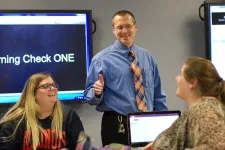(Press-News.org)
Immune system dysregulation and elevated inflammation contribute to the development of the fatal neurodegenerative condition amyotrophic lateral sclerosis (ALS), also known as Lou Gehrig's disease.
In new research published in The FASEB Journal, repeated infusions of certain immune cells delayed ALS onset and extended survival in mice, and also reduced markers of inflammation in an individual with the disease. The work was conducted by investigators at Massachusetts General Hospital, a founding member of the Mass General Brigham healthcare.
“This makes the first step towards a phase I clinical trial of our new cell therapy for ALS, which is now in the planning stage,” said senior author Mark C. Poznansky, MD, PhD, Director of the Vaccine and Immunotherapy Center, an attending physician in General and Transplant Infectious Diseases Medicine at Massachusetts General Hospital, and a professor of Medicine at Harvard Medical School.
Previous work by the group of Ruxandra F. Sîrbulescu, PhD, assistant professor of Neurology and co-corresponding author of the article, showed that direct application of purified B cells, which are immune cells known to produce antibodies, can reduce inflammation and promote recovery in mice with skin or brain injuries.
The benefits resulted from a process termed pligodraxis, in which the B cells adopt immunoregulatory and neuroprotective characteristics to support the repair of damaged tissues in an injured environment.
“What we observed early on in preclinical studies has been a remarkable effect of B cells in the context of brain lesions – both brain structure and function were protected by treatment with these cells, which made us consider applying them as a therapeutic in the context of neurodegenerative disease,” Sîrbulescu said.
In this latest research, the team assessed the effects of B cell infusions in mice prone to ALS and in a person living with the disease.
In mice, repeated intravenous treatments of B cells from donor mice significantly delayed disease onset, extended survival, reduced cell death, and decreased a marker of neurodegeneration.
In the human patient, repeated infusions of donor B cells were safe and led to decreased levels of multiple inflammatory markers.
“We were able to show that B cells, which can be readily obtained from the blood, could treat ALS in a well-established mouse model of the disease, and we obtained permission from the US Food and Drug Administration and our hospital to try this treatment approach in an individual with ALS,” said Poznansky.
"We were able to show safety and efficacy, as well as how the B cell therapy worked in mice, and we demonstrated that our approach was safe and feasible in a human. This is a first study of its kind to apply B cells to the treatment of ALS and sets us up for a trial of this new treatment approach to a currently incurable disease."
Mark Poznansky, MD, PhD
Authorship: Ruxandra F Sîrbulescu, Katharine Nicholson, Kento Kawai Orla M Hilton Don Sobell, Gina Jin, David E Verrill, Liam J Dwyer, Yueyue Xiong, Petra Bachanová, Spencer E Kim, Shannon Gallup, Dario Gelevski, Heather Daley, Diego E Hernandez Rodriguez, Hélène Negre, Olive Sturtevant, Sarah Nikiforow, Jerome Ritz, Yi-Bin Chen, Patrick M Reeves, Ann E Sluder, James D Berry, Ghazaleh Sadri-Vakili , Merit Cudkowicz, and Mark C Poznansky.
Disclosures: Disclosure forms provided by the authors are available with the full text of this article at https://faseb.onlinelibrary.wiley.com/doi/10.1096/fj.202302659R.
Funding: This work was supported by the Ward Family Foundation; Vaccine and Immunotherapy Center Innovation Fund; Vaccine and Immunotherapy Center Education Fund; and Sean M. Healey and AMG Center for ALS.
END
CAR-T cell therapy, which targets a specific protein on the surface of cancer cells, causes tumors to shrink or disappear in about half of patients with large B-cell lymphoma who haven’t experienced improvement with chemotherapy treatments.
But if this CAR-T treatment fails, or the cancer returns yet again — as happens in approximately half of people — the prognosis is dire. The median survival time after relapse is about six months.
Now, a phase 1 clinical trial at Stanford Medicine ...
A major clinical trial, led by experts at the University of Nottingham, has shown the Lee Silverman Voice Treatment (LSVT LOUD®) is more effective than the current speech and language therapy provided by the NHS, when treating patients with Parkinson’s disease (PD).
The results of the NIHR HTA funded trial, which are published today in the BMJ, showed that LSVT LOUD® was more effective at reducing the participant’s reported impact of voice problems than no speech and language therapy, as well as the NHS delivered speech and language therapy.
The trial was led by experts from the Universities of Nottingham and Birmingham, ...
An intensive voice treatment developed in the USA and known as the Lee Silverman voice treatment (LSVT LOUD) is more effective than conventional NHS speech and language therapy or no therapy for people with Parkinson’s disease, finds a trial published in The BMJ today.
The researchers say the results emphasise the need to optimise the use of speech and language therapy resources for people with Parkinson’s disease.
Slurred or slow speech (known as dysarthria) is a common feature of Parkinson’s disease and can have a significant effect ...
“The NHS’s relentless focus on finance and productivity is failing patient safety,” argues patient safety commissioner Henrietta Hughes in an interview for The BMJ today.
“The patient’s anecdote is the canary in the coal mine,” she says. It’s the thing that tells us there’s something going wrong. But too often we hear about patients who have raised concerns being gaslighted, dismissed, and fobbed off.”
Hughes, a GP and former medical director at NHS England, became England’s first independent patient safety commissioner in September 2022.
The job was created ...
For the first time in the World Health Organization’s 76 year history, world leaders have unanimously committed to put social participation - people, communities and civil society - at the heart of health decision making processes.
This landmark pledge marks an important step forward in creating a healthy world, say experts in The BMJ today, and they urge everyone to seize their right to influence the decisions that affect their health and well-being.
Global challenges such as access to care, climate change, widening ...
Artificial intelligence (AI) chatbots have frequently shown signs of an “empathy gap” that puts young users at risk of distress or harm, raising the urgent need for “child-safe AI”, according to a study.
The research, by a University of Cambridge academic, Dr Nomisha Kurian, urges developers and policy actors to prioritise approaches to AI design that take greater account of children’s needs. It provides evidence that children are particularly susceptible to treating chatbots as lifelike, quasi-human confidantes, ...
International refugees and academic experts have contributed to a new book examining the resonance of Dante’s Divine Comedy with today’s migrants fleeing the troubles in their home countries.
Dante on the Move is launched in Rome today (Thursday 11th July) and has been produced as part of a research project Reading Dante with Refugees led by the University of Birmingham and Trinity College Rome. It features work by people from Afghanistan, China, Egypt, Iran, Iraq, Kurdistan, Ukraine, the USA and Venezuela.
Mohammed, a Kurdish refugee from Iraqi and contributor to the book survived a shipwreck in the Mediterranean in which many people drowned. He said: “Reading ...
About a third of Canadians feel lonely, and a study from the University of Waterloo shows it has a greater negative impact on memory than even social isolation, though both present a significant risk to the aging population.
Loneliness is a subjective emotion that people might feel even while engaging in social activities. It is often associated with depression and an increase in stress hormones that may contribute to impaired memory.
Waterloo researchers examined four combinations of social isolation ...
ATLANTA — To offer cross-protection against diverse influenza virus variants, nanoparticle vaccines can produce pivotal cellular and mucosal immune responses that enhance vaccine efficacy and broaden protection, according to a study by researchers in the Institute for Biomedical Sciences at Georgia State University.
The study, published in the journal Nature Communications, offers valuable insights into tailoring immunization strategies to optimize influenza vaccine effectiveness. To alleviate the significant ...
URBANA, Ill. – Colleges and universities often highlight leadership development as a critical component of their curriculum — but there is no clear consensus on what constitutes effective leadership education. In a new paper, two educators from the University of Illinois Urbana-Champaign and John Carroll University provide a roadmap for training competent leaders, suggesting a comprehensive, practical approach for postsecondary institutions to follow.
“Our purpose was to discuss what it means to develop leaders and what a model for leadership education could ...


